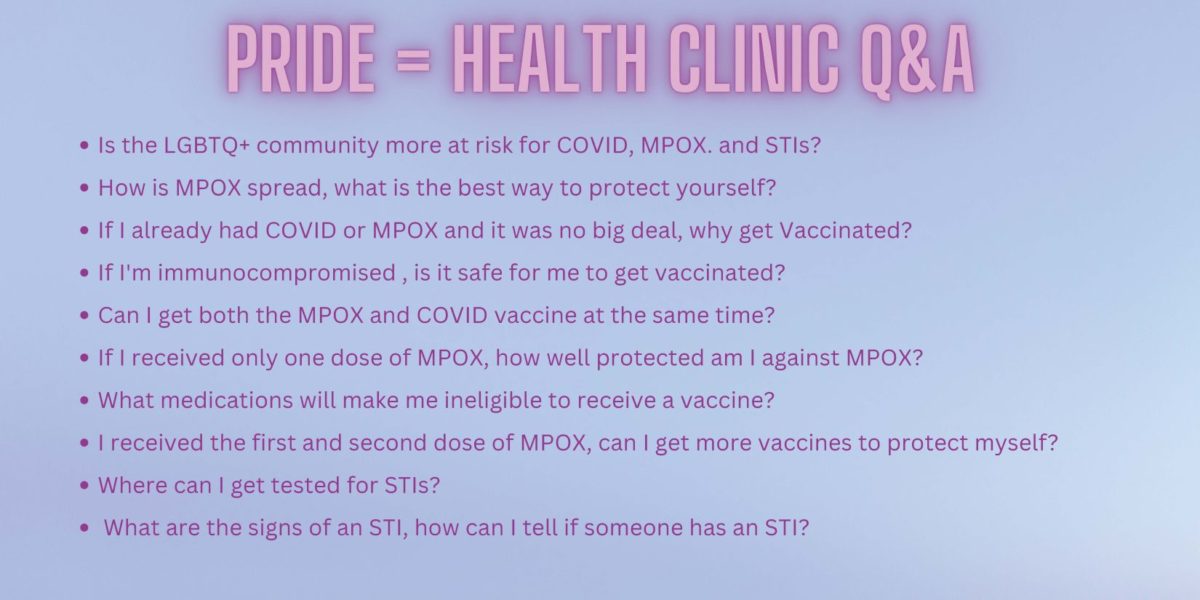PRIDE = HEALTH CLINIC Q&A
Try and choose the responses that best answer the questions. (hint: more than one is a safe bet) (Covid and Mpox)
- Is the LGBTQ+ community more at risk for COVID, MPOX. and STIs (Sexually Transmitted Infections)?
a. Yes, COVID affects everyone regardless of gender, race, sex, or age.
b. Anyone can get mpox. It spreads from contact with infected people via- touch, kissing, and sex and materials, such as contaminated sheets, clothes, or needles.
c. Yes, most STIs are spread among those who engage in sexual activity with multiple partners. Even if you practice safe sex, get tested at one of the free STI clinics around LA County.
2. How is MPOX spread? What is the best way to protect yourself?
a. It spreads from contact with infected people via- touch, kissing, and sex and materials, such as contaminated sheets, clothes, or needles.
b. The best way to protect yourself is by receiving the Jynneos vaccine.
c. If you have symptoms, Click here: Public Health’s Sexual Health Clinic.
- If I already had COVID or MPOX and it was no big deal, why get vaccinated?
a. It is best to receive the vaccine for COVID because if you get infected again, the symptoms won’t be as severe.
b. It is best to receive the vaccine for MPOX, an important tool in stopping the spread of mpox. Vaccinated people should avoid close, skin-to-skin contact with someone with mpox. - If I’m immunocompromised, is it safe for me to get vaccinated?
a. If you are moderately or severely immunocompromised (have a weakened immune system), you are at increased risk of severe COVID-19 illness and death. Additionally, your immune response to COVID-19 vaccination may not be as strong as in people who are not immunocompromised.
b. If you are immunocompromised, you are at an increased risk of contracting MPOX. Additionally, your immune response to Jynneos vaccination may not be as strong as in people who are not immunocompromised.
5. Can I get both MPOX vaccines and COVID-19 vaccines at the same time?
a. CDC guidance advises that the Jynneos vaccine can typically be administered simultaneously with other vaccines at different sites on the body if possible.
b. However, people who want to get vaccinated against mpox and receive a COVID-19 vaccine within four weeks of each other should talk to a healthcare provider.
6. If I received only one dose of MPOX, how well protected am I against MPOX?
a. Although early findings suggest that the first dose of the JYNNEOS vaccine gives some protection against mpox, two doses are recommended to provide stronger protection.
b. You should still get two doses if you get the vaccine subcutaneously or intradermally.
c. For more information on mpox, including general information, testing, treatment, and vaccines: (833) 540-0473. Open 7 days a week 8:00am – 8:30pm
7. What medications will make me ineligible to receive a vaccine?
a. No medication will make you ineligible.
b. If you are allergic to anything that causes you to go into anaphylaxis shock, please let the provider know, as it may make you ineligible.
8. I received the first and second doses of MPOX. Can I get more vaccines to protect myself?
a. Currently, there are no recommendations to receive more vaccines for protection.
b. Once there is approval by CDC, your local health department will announce it.
9. Where can I get tested for STIs(Sexually Transmitted Infections)?
a. LA Dept. Public Health has free STI/HIV clinics throughout LA County.
b. Call the toll-free National CDC STI Hotline at (800)227-8922
c. Call the toll-free Los Angeles County STI Hotline at (800)758-0880 for questions about STIs, referrals to free and low-cost testing in LA County, and free condoms by mail (Additional LA County Hotlines).
- What are the signs of an STI (Sexually Transmitted Infections)? How can I tell if someone has an STI?
a. There are no signs of an STI, especially with someone newly affected.
b. It is possible to have an STI but not have any symptoms. Having symptoms is good because they let you know something is wrong. If you notice anything different than what is typical in your genital area, visiting a doctor as soon as possible is very important.
c. When they occur, typical STI symptoms for women may include unusual vaginal discharge (flow), sores, bumps, burning when urinating, and redness or itching around the vaginal area. Typical symptoms for men may include discharge from the penis, burning when urinating, and sores, bumps, or redness on or around the penis. - What is the difference between a pandemic and an endemic? (Bonus question)
a. An endemic is a constant presence of the virus in a community.
b. It differs from a pandemic because the virus is somewhat contained and not spreading out of control and not stressing the health care infrastructure, therefore we can more easily prevent and treat it.
In fact, ALL THE ANSWERS are correct. We thought it best not spread info that will just confuse the issues.
REFERENCES
- https://www.cdc.gov/poxvirus/mpox/vaccines/index.html
- https://cdphe.colorado.gov/diseases-a-to-z/mpox-faq
- https://www.cdc.gov/coronavirus/2019- ncov/vaccines/recommendations/immuno.html#mod
- https://www.cdc.gov/poxvirus/mpox/clinicians/people-with- HIV.html#anchor_1670628054467
- https://www.cdc.gov/msmhealth/STD.htm
- https://www.who.int/news-room/fact-sheets/detail/monkeypox
- http://publichealth.lacounty.gov/dhsp/STDInfo.htm

